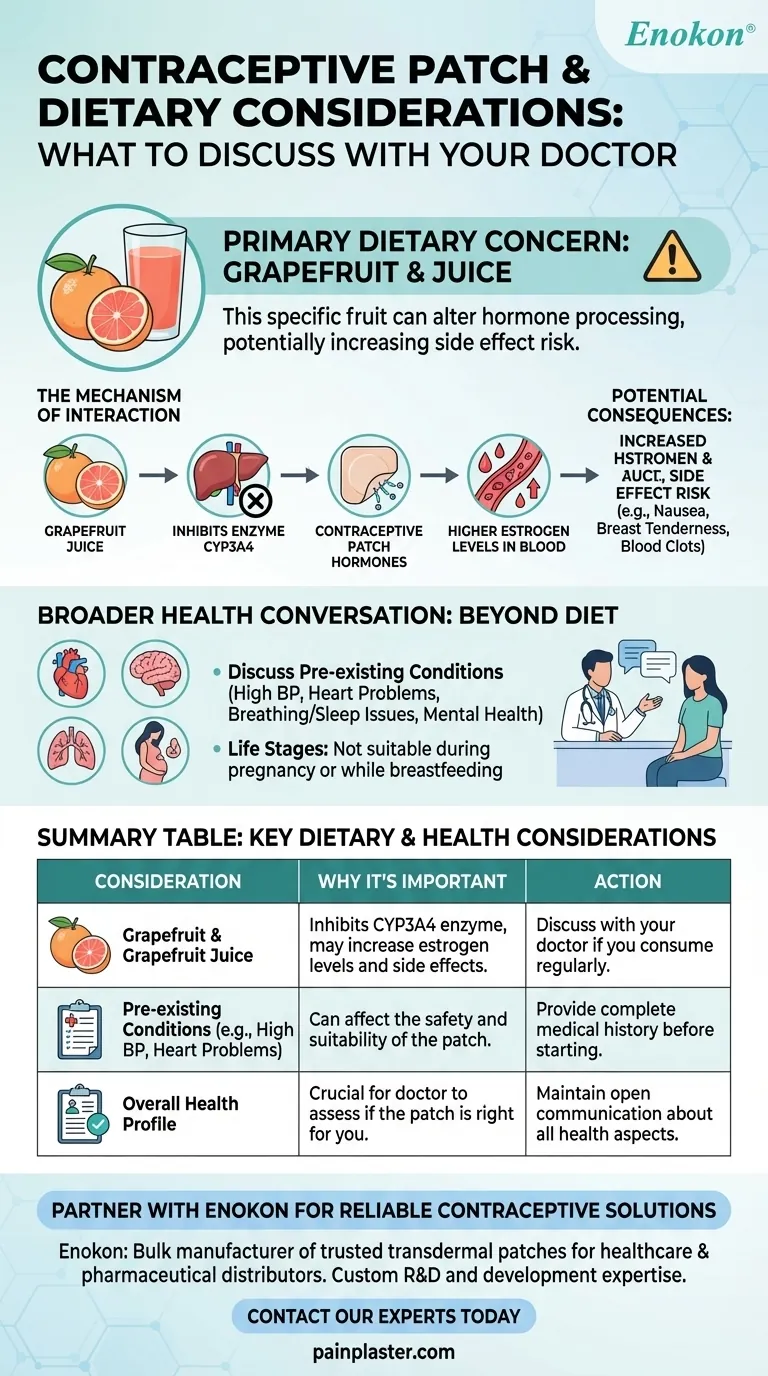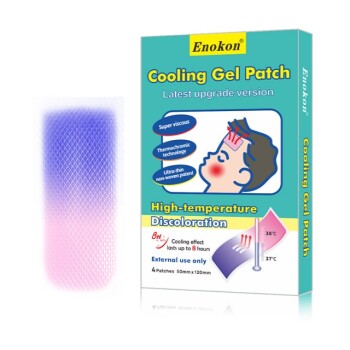The primary dietary consideration to discuss with your doctor while using the contraceptive patch is the consumption of grapefruit and grapefruit juice. This is due to a specific chemical interaction that can alter how your body processes the hormones in the patch, potentially increasing the risk of side effects. While this is the only specific food item of note, the broader principle involves keeping your doctor informed about your overall health.
While grapefruit is the only specific food known to interact with the hormones in the contraceptive patch, the more critical principle is maintaining open communication with your doctor about your complete health profile, including any pre-existing conditions.

Why Grapefruit is a Specific Concern
The warning about grapefruit isn't a general dietary guideline; it's based on a well-understood pharmacological interaction. It's crucial to understand the mechanism to appreciate the risk.
The Mechanism of Interaction
Grapefruit and its juice contain compounds that can inhibit a key enzyme in your intestines. This enzyme, known as CYP3A4, is responsible for breaking down and metabolizing many medications, including the estrogen in the contraceptive patch.
Think of this enzyme as a gatekeeper that controls how much of the hormone enters your bloodstream. Consuming grapefruit can temporarily "close" this gate.
Potential Consequences
When this enzyme is blocked, the hormones from the patch may not be broken down as efficiently as they should be. This can lead to higher-than-intended levels of estrogen circulating in your blood.
The Impact on You
Elevated hormone levels don't necessarily reduce the patch's effectiveness at preventing pregnancy, but they can significantly increase your risk of experiencing hormone-related side effects. These can range from nausea and breast tenderness to more serious issues like blood clots.
Beyond Diet: A Broader Health Conversation
The need to discuss grapefruit is part of a larger conversation you must have with your doctor. Your overall health status is the most important factor in determining if the patch is a safe option for you.
Pre-existing Medical Conditions
It is essential to inform your doctor if you have a history of certain conditions. Hormonal contraceptives can be affected by or can exacerbate issues such as:
- High or low blood pressure
- Heart problems
- Breathing problems or sleep disorders
- Mental health issues like depression
Life and Health Stages
Your doctor also needs to know if you are pregnant, planning a pregnancy, or breastfeeding. The contraceptive patch is not suitable for use during these times.
Understanding the Limitations
It's important to approach this information with the right perspective. The goal is to manage risk, not to create unnecessary anxiety about your diet.
The Variable Nature of the Interaction
The extent to which grapefruit affects hormone levels can vary significantly from person to person. Because this effect is unpredictable, the standard medical advice is to avoid the combination.
The Doctor's Role is Essential
Self-managing this potential interaction is not advisable. Your doctor can assess your personal health profile and help you decide if the contraceptive patch is the best and safest choice for you.
When to Seek Further Help
Beyond the initial consultation, maintain an open line of communication. You should consult your doctor if any side effect lasts for more than a week, gets worse, or keeps returning.
Making the Right Choice for Your Health
Use this information to have a productive conversation with your healthcare provider. Your approach should be tailored to your specific situation.
- If you regularly consume grapefruit: You must discuss this with your doctor to assess your individual risk and determine if this contraceptive method is appropriate for you.
- If you have existing health conditions: Your primary responsibility is to provide your doctor with a complete and accurate medical history before starting the patch.
- If you experience any new or worsening symptoms: Contact your doctor immediately to ensure they are not a sign of a serious medical problem.
Proactive communication with your healthcare provider is the single most effective tool for ensuring your contraceptive method is both safe and reliable.
Summary Table:
| Key Dietary & Health Consideration | Why It's Important |
|---|---|
| Grapefruit & Grapefruit Juice | Inhibits an enzyme (CYP3A4), potentially increasing estrogen levels and side effects. |
| Pre-existing Conditions | Conditions like high blood pressure or heart problems can affect the patch's safety. |
| Overall Health Profile | A complete health history is crucial for your doctor to assess if the patch is right for you. |
Need a reliable, high-quality contraceptive patch for your patients or brand? Partner with Enokon, a bulk manufacturer of trusted transdermal patches for healthcare and pharmaceutical distributors. We offer custom R&D and development expertise to create the precise solutions you need. Contact our experts today to discuss your requirements.
Visual Guide

Related Products
- Prostate Pain Kidney Health Care Patch for Men
- Capsaicin Chili Medicated Pain Relief Patches
- Far Infrared Deep Heat Relief Patches Medicated Pain Relief Patches
- Lidocaine Hydrogel Pain Relief Patch for Pain Relief
- Icy Hot Menthol Medicine Pain Relief Patch
People Also Ask
- What is the purpose of testosterone patches? A Steady Solution for Low Testosterone
- What should be done before undergoing an MRI while using testosterone patches? Remove it to prevent serious burns.
- What should patients tell their doctor before using testosterone patches? A Guide to Safe Treatment
- What lifestyle factors should be considered when choosing between testosterone patches and injections? Find Your Best Fit
- How often should testosterone patches be applied? Daily Dosage & Best Practices
















